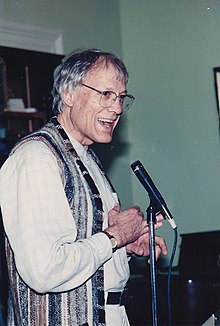Walter Wink
| Walter Wink | |
|---|---|

Walter Wink preaching. From the Fellowship of Reconciliation archives.
|
|
| Born |
May 21, 1935 Dallas, Texas, United States |
| Died | May 10, 2012 (aged 76) Berkshire Mountains, Massachusetts, United States |
| Occupation | minister, theologian, author |
| Language | English |
| Nationality | United States |
| Ethnicity | Caucasian |
| Citizenship | United States |
| Spouse | June Keener Wink |
| Children | Rebecca Wink, Steve Wink, Chris Wink and Stepchildren: Kim Bergland, Kurt Bergland |
| Website | |
| www |
|
Walter Wink (May 21, 1935 – May 10, 2012) was an American biblical scholar, theologian, and activist who was an important figure in Progressive Christianity. Wink spent much of his career teaching at Auburn Theological Seminary in New York City. He was well known for his advocacy of and work related to nonviolent resistance and his seminal works on "The Powers", Naming the Powers (1984), Unmasking the Powers (1986), Engaging the Powers (1992), When the Powers Fall (1998), and The Powers that Be (1999). He is also known for coining the phrase "the myth of redemptive violence".
Wink earned a B.A. from Southern Methodist University in 1956, majoring in history, and minoring in philosophy and English. He completed his Master of Divinity in 1959 and his Ph.D. in 1963, both from Union Theological Seminary in New York City. Ordained as a Methodist minister in 1961, he served as Pastor of First United Methodist Church, in Hitchcock, Texas from 1962–67. He then returned to Union Seminary as an Assistant Professor of New Testament, then Associate Professor of New Testament, from 1967-1976. After being denied tenure at Union, he began teaching at Auburn Theological Seminary, remaining there until his death, when he was Professor Emeritus. His faculty discipline was Biblical interpretation. In 1989–1990, he was a Peace Fellow at the United States Institute of Peace.
He was known for his work on power structures, his commentary on current political and cultural matters, and his contributions to the discourse on homosexuality and religion, pacifism, the relationship between psychology and biblical studies, and research related to the historical Jesus. Neal Stephenson likens some of Wink's ideas to "an epidemiology of power disorders", a phenomenology of oppression. Author Philip Yancey references Wink frequently in his work.
...
Wikipedia
